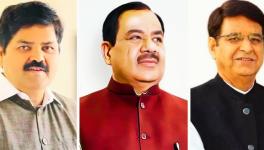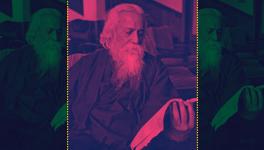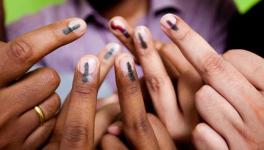‘Bolster Resolve to Fight Communal Hatred’: Kolkata’s Civil Society on 30th Anniversary of Babri Masjid Demolition
Babri Masjid. Image Courtesy: PTI
Kolkata: The 30th anniversary of the Babri Masjid demolition was observed on Tuesday in Kolkata as the civil society, including political personalities, teachers, and renowned journalists, recollected the fateful day in Indian history.
On Tuesday evening, a rally of Left activists is scheduled to take place to mark the day. Communist party of India (Marxist) state secretary MD Salim, Left Front Chairman Biman Basu, Politbureau member Dr Suryakanta Mishra, along with other leaders of the Left Front constituents, will take part in the rally. Thespian Bibhas Chakraborty is also slated to preside over a program at Ranucchaya Manch, which has been organised to condemn the Babri Masjid demolition.
Speaking to NewsClick, former lawmaker MD Salim detailed his account of the demolition. He said that as he was elected a member of the Rajya Sabha in 1990, his memory of the incidents is still strong.
Recalling the event, he said that the march for Ram Mandir taken out by the Bharatiya Janata Party had instigated riots all over the country ahead of the demolition itself. On December 5, 1992, all opposition leaders led by former Prime Minister VP Singh marched towards Ayodhya. However, at Ramsuneri Ghat, situated on the banks of the Sarayu river, the opposition leaders, including Prakash Karat and MD Salim, were arrested. Upon reaching New Delhi the next day, they heard the ghastly news that Babri Masjid had been demolished, he said. With the demolition, riots spread throughout the country, and a curfew had to be imposed in 365 districts across India. This was the first time after independence that curfew was imposed on such a vast scale.
“In the subsequent day, I was in Delhi coordinating relief and rehabilitation efforts in East Delhi and Old Delhi. The Parliament was left sine die after a proposal condemning the heinous act was taken up. The then Chairman of Rajya Sabha, MK Narayanan, who later became the President of India, said that ‘It is the second such act of cowardice after the murder of [Mohandas] Gandhi and also the second such attack on the soul of India’,” he said.
Salim added, “The next day, I returned to Kolkata where organised criminals were creating a ruckus with curfew pass. For the next ten days, we went to mixed areas.” Describing the aftermath of the demolition in the West Bengal capital, he said, “The then CM Jyoti Basu had taken a strict role regarding the riots and called for the army to be deployed in Kolkata. Along with MLA Laxmi Dey and DYFI leader Manab Mukherjee, I went to Garden Reach, Topsia, Motijheel, and our activists were mobilised 24x7. That political mobilisation was a learning process for all of us.”
Speaking about ensuing communal violence in Mumbai, Salim said, “When there were riots in Mumbai in January (1993), on the words of HK Surjeet (part of CPI(M) Navaratna and former General Secretary of the party), I moved to Mumbai for a fortnight. There we saw how communal violence vitiates an atmosphere. The DYFI in Mumbai constructed a platoon of volunteers to assist the law enforcement agencies in rushing to areas where communal violence was about the start.”
Amina Khatun, 35, a teacher by profession, told NewsClick that she wanted to forget those days, and when the problems of livelihood are at the front, then those dark days should be forgotten. “It is the BJP who uses it, and the faster the history leaves those dark episodes, the better it is,” she said.
The Imam of Nakhoda Masjid, Shafiq Quasmi, claimed that their voices have been excluded in present India; “our hands have been tied, and tongues torn away,” he said. “This condition exists for the whole population of the country and they should take steps for its remedy,” the Imam told NewsClick.
Senior Journalist Aniruddha Chakraborty who was on duty as a reporter on December 6, 1992, also recollected that the demolition of Babri Masjid was a counter-revolution. “It was in the late 80s and initial years of the 90s that the Leftists were a rising force in the Indian parliamentary system. Though communalism was always imbibed in Bengal’s societal strata, years of communist movement had lessened its impact on civilian lives in the state. Leaders like Jyoti Basu fought with valour against the communal forces. Even the Congress leadership fought the communal forces,” he told NewsClick.
Chakraborty added that the Babri demolition put the communal question on a permanent agenda. “There was an attempt to stoke fire in West Bengal as well, and at times, going out on the ground with then minister Prasanta Sur, I saw the affected areas of Metiaburuz and Park Circus (which are predominantly Muslim areas,” he said.
Speaking to NewsClick, senior journalist and editor of the national daily Times of India, Sougata Roy, said that December 6 was an assault on the secular fabric of the country, and the danger persists even today. “Those who did it, didn’t only demolish a mosque but attacked the very premises of the Constitution. Also, it is a fact that the Supreme Court later allowed the construction of Ram Mandir in the same place. What surprised me on that day (December 6, 1992) was how a city, which was otherwise accommodative and friendly to all religions, changed overnight, showing communal shades in the society,” he said.
Poet Mandakranta Sen said that December 6 is a black day for democracy in the country, and every December 6, “we double our resolves to fight against the communal hate mongers.” He said, “The fundamentalists eat, drink and make merry with religions. December 6 is a day to realise not to damage any place of worship but to take everybody along towards the goal of people being able to sleep with a full belly at night.”
An iconic television journalist of Kolkata, Doordarshan’s former News Director Snehasish Sur, also the President of the Kolkata Press Club, said that in his experience of work during that period, he saw then CM Jyoti Basu's role in curbing the riots. The stern measures taken by the late Communist leader and chief minister stopped the rioters, and the army was mobilised in Kolkata. “We moved to Kolkata with curfew passes and saw Mother Teresa giving relief to the needy at Entally bustee area,” he told NewsClick.
“Many such events are still embedded in our hearts,” the veteran journalist said. Sur also appealed to all to come out of their sectarian interests. “Religious win or loss should not be an agenda in the contemporary world. Society has to move forward,” he concluded.
Get the latest reports & analysis with people's perspective on Protests, movements & deep analytical videos, discussions of the current affairs in your Telegram app. Subscribe to NewsClick's Telegram channel & get Real-Time updates on stories, as they get published on our website.
























